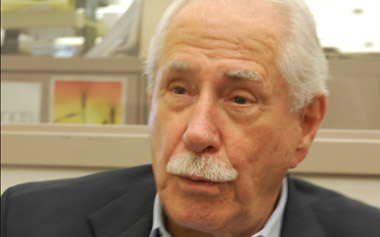When he saw the airplanes flying into the Twin Towers, Mike Gravel went into a three-day depression. “It wasn’t because of the loss of life, though that was bad enough,” he says. “My concern was what this would do to the American psyche.” Sure enough, in the intervening years, he says, “our civil rights have been savaged” and we’ve spent “a trillion dollars for wars,” which, he adds, helped to set up our economy for a fall.
Gravel, born in Springfield, is a former U.S. Senator—he represented Alaska from 1969 though 1981—who in 1971 assisted Daniel Ellsberg to get the Pentagon Papers into the public record. Now he is on a mission to get a new investigation, not conducted by government appointees, of the events of September 11, 2001. The government’s explanation of the events of that day, he says, “doesn’t pass the smell test.”
In particular, the evidence presented by architects such as Richard Gage (AEA911truth.org) that the straight-down collapse of the Twin Towers and, at 5:20 that afternoon, of Building 7—which was not hit by an airplane—was due to controlled demolition rather than the impact of the planes has deepened Gravel’s conviction that the public doesn’t know the whole truth about the attack.
Gravel also finds suspect the the National Institute of Standards and Technology’s refusal to test dust from Building 7 for nanothermitic residue even after credentialed scientists published an article on the discovery of the high-tech explosive in the dust.
“I don’t believe the government’s story line and I don’t believe 50 percent of the people believe the government’s story line,” he told the Advocate. He noted that Building 7 contained “all records of Enron and over 1,000 cases of criminality on Wall Street.”
Gravel visited Massachusetts last week to help launch an initiative petition that needs more than 80,000 signatures by November 23. His plan is to enact initiatives in several states to form a coalition that can then add other states under a Joint Powers Agreement; eventually the coalition will choose citizens to serve on a commission with subpoena power and the power to put witnesses under oath. The latter is important, he explains, because of the pressure it brings to bear in eliciting truthful testimony.”During Watergate,” he points out, “people went to jail for perjury, not for the crime.”
Members of the official 9/11 Commission have acknowledged that they did not get to the bottom of what happened that day. Gravel points to remarks like this from former New Jersey Attorney General John Farmer, senior counsel to the Commission: “At some level of the government, at some point in time& there was an agreement not to tell the truth about what happened& there were interviews made of the FAA’s New York center the night of 9/11 and those tapes were destroyed. The CIA tapes of the interrogations were destroyed. The story of 9/11 itself, to put it mildly, was distorted and was completely different from the way things happened.”
All of which, says Gravel, “warrants a new investigation, not by the government, but by citizens who will pursue evidence wherever it leads.”



